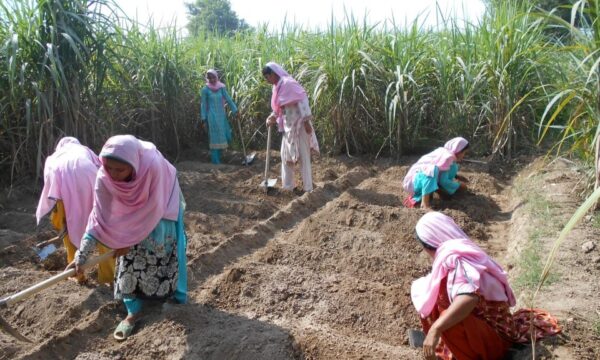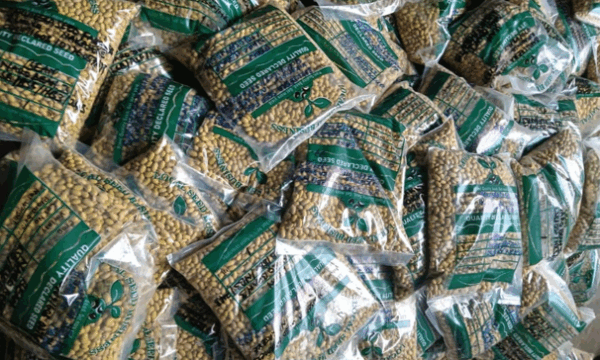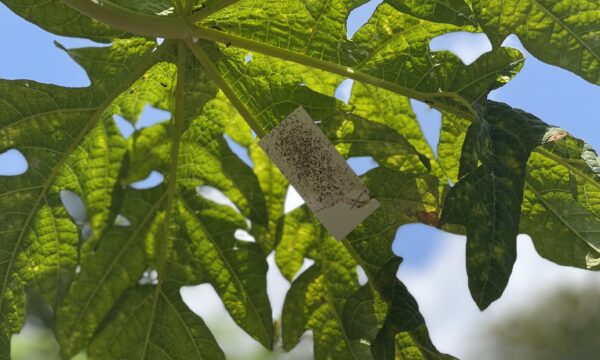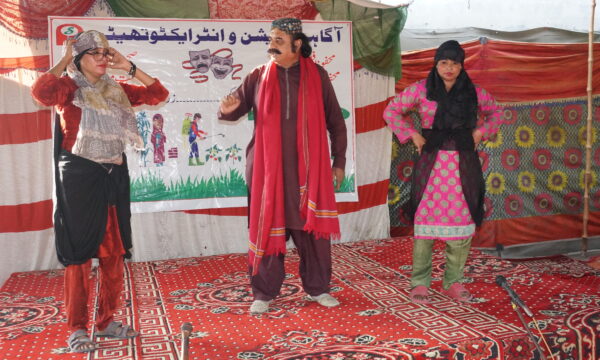Last month, CABI in Pakistan conducted the 5th PlantwisePlus National Forum Meeting. The forum, with the national and provincial agriculture departments, aims to improve Pakistan’s food security through CABI’s flagship PlantwisePlus programme.

Strengthening partnerships for PlantwisePlus in Pakistan
The meeting, held on 22nd December 2023 in Lahore, aimed to strengthen the collaboration between PlantwisePlus and national and provincial agriculture departments. The Federal Minster for National Food Security and Research (MNFS&R), Dr Kausar Abdullah Malik, chaired the meeting. Secretary Agriculture AJK, Chairman PARC, DG DPP and key stakeholders also attended the meeting.
CABI’s Senior Regional Director for Asia, Dr. Babar Ehsan Bajwa, welcomed the participants. He also highlighted the achievements of the Plantwise programme. He briefed that CABI officially launched the PlantwisePlus programme in 2022 to help improve the country’s food security through a more coordinated and sustainable approach to food production across the value chain.
The CABI-led programme supports Pakistan’s Government and the country’s smallholder farmers to predict, prepare and prevent plant health threats to reduce crop losses. Thus improving livelihoods.
He added that a particular focus will be on promoting and using safer and more environmentally friendly biological control agents. Instead of an overreliance on potentially more harmful chemical pesticides, to protect crops including cotton, rice, maize, wheat, and sugarcane.
Supporting smallholder farmers
The Federal Minister stated, “Climate change is impacting agriculture in a number of ways, often exacerbating existing challenges to crop production. Smallholder farmers in developing countries are the most vulnerable and disproportionately affected because they lack the capacity to cope with uncertainties created by a rapidly changing world.”
He added, “Smallholders need to adapt farming practices to climate hazards to maintain the quality and quantity of crops or, in some cases, diversify into new forms of farming and livelihoods. But access to reliable information about climate hazards, and approaches to mitigate risks or adapt through diversified crops and new practices is limited for smallholder farmers”.
The Minister appreciated the contributions of CABI to Pakistan’s agriculture system and encouraged stakeholders to generate on-ground results under PlantwisePlus.

Chairman of the Pakistan Agricultural Research Council (PARC) Dr Ghulam Muhammad Ali said, “Smallholder farmers can confidently face the challenges of climate change and plant health threats through the promotion of sustainable approaches to crop production, increasing incomes and the supply of safer food”.
“Together we are supporting the national system in how to adopt the best practices in plant health – to improve the safety, resilience and quality of crops which, ultimately, will lead to greater food security and livelihoods for smallholder farmers and their families.”
Advancing the use of digital advisory tools
Dr Muhammad Naeem Aslam, CABI’s PlantwisePlus Country Coordinator, said that the aim is to improve and mainstream sustainable agriculture development. For poverty alleviation of resource-poor farming communities. It will strive to do this by identifying key crops where quantity and quality can be improved. Key to this will be the use of digital advisory tools to boost climate-smart plant health practices.

Representatives of provinces also briefed the participants on their departmental role and support for PlantwisePlus. They agreed that increasing the supply of and demand for safer, higher quality and locally produced food in domestic markets is important. Also pertinent is the desire to strengthen detection and response to pest outbreaks. Plus, the enhanced availability of safer plant protection products. They further pledged to continue their support for the success of the programme and uplifting smallholder farmers.
Find out more about PlantwisePlus in Pakistan
Trichogramma mass rearing facilities piloted in Pakistan
Pest risk training to help detect Pakistan’s potential invaders
Author: Umair Safdar
Contributors: Donna Smith, Yasar Saleem Khan, and Muhammad Ayaz Keerio
PlantwisePlus gratefully acknowledges the financial support of the Directorate-General for International Cooperation (DGIS), Netherlands; European Commission Directorate General for International Partnerships (INTPA, EU); the Foreign, Commonwealth & Development Office (FCDO), United Kingdom; and the Swiss Agency for Development and Cooperation (SDC).
1 Comment
Leave a Reply
Related News & Blogs
Training Sri Lanka’s agro-dealers in pesticide risk reduction
Agro-dealers provide vital support to Sri Lanka’s farmers. These agricultural input suppliers are often the first point of contact for smallholders who need advice on plant protection products. However, agro-dealers often lack formal training in safer…
3 July 2025





It was really wonderful event which bring together key partners and stakeholder (Public & private) associated with PlantwisePlus in one platform.